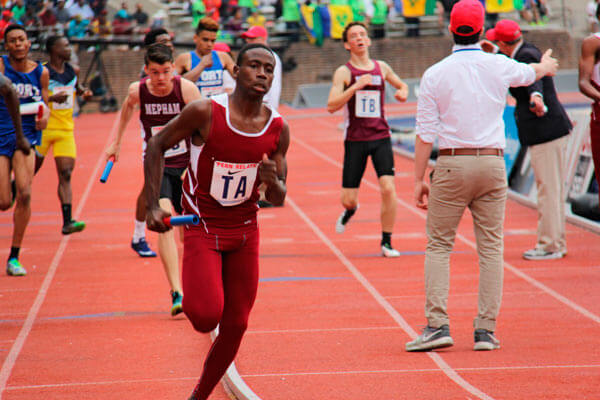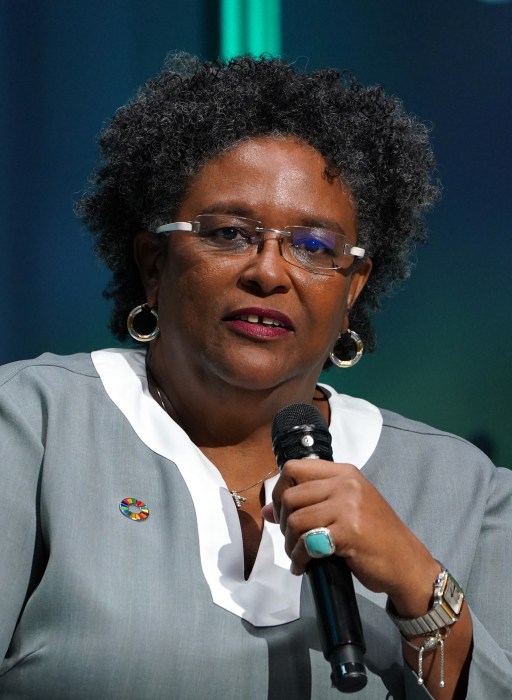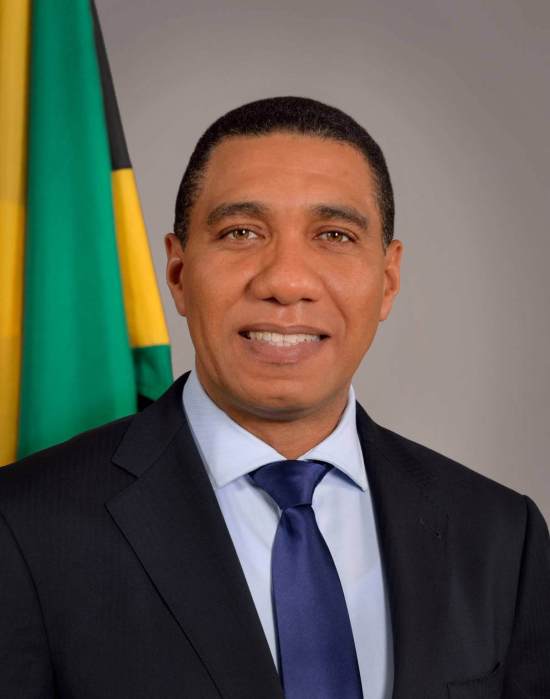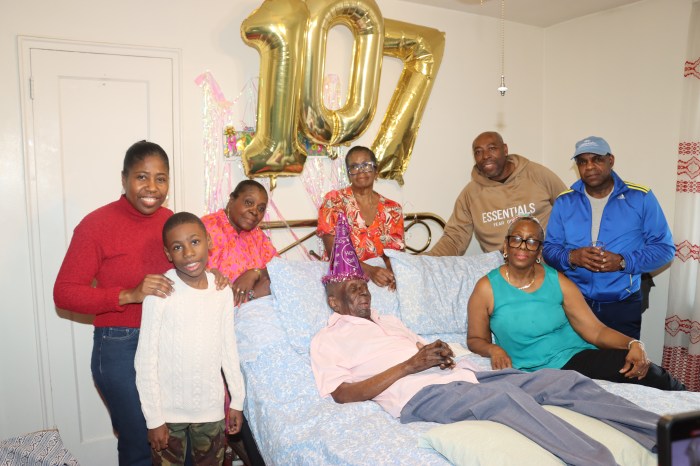Each time the Penn Relays announcers mentioned the names Thomas Saunders Secondary School (TSSS) and the St. Vincent Grammar School (SVGS) at the 123rd Penn Relay Carnival in Philadelphia, Pa — ran over three days, Thursday through Saturday — the nation of St. Vincent and the Grenadines, undisputedly, received greater exposure in the international arena.
For the past seven years, only one Vincentian school, TSSS — through the initiative of Philadelphia-based mastermind James Cordice —competed in the oldest and largest track and field competition in the United States.
But, unequivocally, not wanting to be left out any longer, SVGS joined TSSS, for the first time, in this year’s Relay Carnival, hosted annually since April 21, 1895 by the University of Pennsylvania at the Franklin Field stadium in Philadelphia.
And, together, SVGS and TSSS, which boasted all-male teams, made St. Vincent and the Grenadines even prouder, as the schools competed in a meet that attracts over 15,000 participants from high schools, colleges and track clubs throughout North America and abroad, primarily Jamaica, competing in more than 300 events.
SVGS is an all-boys secondary school; TSSS, a mixed school, did not field a female team this year for the first time since it began competing in the Penn Relays.
Penn Relays organizers put the three-day total attendance at this year’s meet at 108,912, with 22,894 fans on Thursday, 38,598 on Friday, and 47,420 on the climaxing Saturday.
“More athletes have run at the Penn Relays than at any single meet in the world,” said Penn Relays organizers, adding that “more spectators have watched the meet than any in the world, except the Olympics and World Championships.”
No wonder that Vincentian organizers did not want to miss out on this glorious opportunity! They, therefore, expressed delight and lauded the schools’ performance in separate, exclusive interviews with Caribbean Life and at a gala reception Saturday night and a brunch the next day, for the athletes, at the Vincentian-owned Calabash Restaurant and Banquet Hall on Lancaster Avenue in Philadelphia.
Curtis M. King, SVGS’ sports-loving head master, who led his school’s contingent, said SVGS had three objectives: “Firstly, exploring our students to various regional and international sporting competitions; secondly, by exposing the students to international meets, they’ll be exposed to further athletic prowess, as well as academic pursuits; and, thirdly, we hope this trip would revitalize the Alumnae Association.”
“The whole experience itself would have been great for the students,” King told Caribbean Life. “It was a great learning experience for the athletes and the coach [Rawlston Morgan].”
Morgan also told Caribbean Life that he had always looked forward to SVGS competing in the Penn Relays.
“I’m very pleased,” he said about the boys team’s performance in the 4x100m relay on Friday and the 4×400 relay the next day. “I don’t think I can ask for more.
“I had concerns here and there, but the guys [athletes] came up trumps and did well,” he added over Sunday’s brunch. “The guys ran their hearts out.”
Morgan said he was particularly pleased with the team’s 4x400m performance, in which it eclipsed the targeted 3.33-odd qualifying time, running at 3:27.26 and placing sixth among 10 schools. Mc Donogh School in Owings Mills, MD won the High School Boys’ heat in 3:24.77.
The SVGS 4 x 400m team comprised Gian-Luca Da Silva (52.38); Jevonie Lavia (52.22); Randolph Richards (50.73); and Ethan Myers (51.94).
In the 4 x 100m, SVGS placed third, with Morgan singling out Peruvian Vale native and anchor Javon Rawlins, 17, “who powered us.”
But, even with less emphasis on the 4x100m, since it is not a qualifying event for the Penn Relays, TSSS did well, according to Head Coach Godfrey “Fuzzy” Harry.
“It’s not the best for us, but we have to commend the effort,” said Harry, stating that the team, comprising Atiba Lewis, Zenron Chance [competing in the Penn Relays for the second successive year], Immanuel Henry and Inglis Daniel, placed sixth, clocking 45.58.
In the 4x400m, TSSS surpassed its best time at home, 3:33.12, placing fifth among 11 schools and clocking 3:27.41. The heat was won by Samuel Tilden High School in Brooklyn in 3:22.74.
TSSS 4x400m team comprised Zenron Chance (52.31), Immanuel Henry (49.05), Joel Jack (52.66) and Maurice Foster (53.40).
“They had a good time in comparison to this year’s in the Grenada Relay Classic,” Harry told Caribbean Life, disclosing, at the same time, that the girls, who had “some set-backs” and did not compete for the first time this year, will definitely be part of the contingent for next year’s Penn Relays.
Cordice, the former president of the Philadelphia-based St. Vincent and the Grenadines Organization of Pennsylvania (SVGOP), asked Harry and Morgan at the reception to choose an athlete from each school who merited the Otis Jack Memorial Award.
Jack —who had “reached out to all schools” at home, on Cordice’s behalf, to compete in the Penn Relays — succumbed to cancer last year, Cordice said. Harry chose Henry, and Morgan picked Rawlins.
With the athletes being the toasts of honor, Cordice then invited members of the audience, including executive members of Vincentian groups in the US Diaspora, to present each athlete with a medal.
Besides the Brooklyn-based umbrella Vincentian group, Council of St. Vincent and the Grenadines Organizations, U.S.A., Inc. (COSAGO), which organized a bus-load of Vincentians from New York to give boisterous support for the athletes, representatives from Vincentian groups in Philadelphia, Washington, D.C., and Boston, Mass. attended the reception.
King also asked his eight athletes — Lavia, Rawlins, Myers, Richards, Da Silva, Zwicka Charles, Rasheed Fontenelle and Sage Primus — to present a “token of appreciation,” containing the Penn Relays team photo, to executive members of some Vincentian groups and individuals present at the reception.
On Sunday, during the brunch, Vincent Heath — former chairman of Team Jamaica Bickle, the Brooklyn-based group that provides meals and other support to Jamaican and other Caribbean teams during the Penn Relays — presented a care packet to Rawlins.
Earlier on that day, through Cordice’s instrumentality, SVGSS and TSSS athletes and officials toured Arcadia University in Glenside, Pa, where the athletes received application packages for possible enrollment.
“Today, St. Vincent and the Grenadines, with so scarce [financial] resources, can compete in the international arena,” said Ancilla Friday, who coordinates a Walk-a-ton annually at Brooklyn’s Marine Park, on April 1, for the Brooklyn-based group, Club St. Vincent, Inc., in helping to raise funds for Vincentian athletes participating in the Penn Relays.
“So, we have to keep it [competing in the Penn Relays] going,” added the ex-Club St. Vincent, Inc. president at Saturday night’s reception. “Teachers, teach your students; athletes, we are the wings beneath your wings.”
“For us, you’re representing St. Vincent and the Grenadines,” said COSAGO President Laverne McDowald-Thompson, turning to the athletes. “Continue doing what you’re doing.”
St. Vincent and the Grenadines Consul General Howie Prince said both teams, indeed, did the nation proud, calling them “ambassadors” and noting the strong organizational skills in making the trek to, and competing in, the illustrious Penn Relays.
For Cordice, it was an effort worth expending.
“It was an extraordinary thing to see a second Vincentian school compete in the Penn Relays,” he said in a Caribbean Life interview. “It’s what’s the program is geared for — to have as many Vincentian secondary schools as possible. So, we’re going forward with making the dream of having multiple schools [compete in Penny Relays] a reality. It’s chilling to see it unfold. Definitely, it’s putting St. Vincent and the Grenadines on the international stage.
“In terms of the support for this mission, I’m pleased with persons who want to come forward to lend a hand to the athletes,” he added. “However, I’m gently asking persons to stay on cue, because there are guidelines about how this mission has been working. So, we must not deviate from what has taken place in the past seven years. Overall, the 2017 mission was a success.”




























